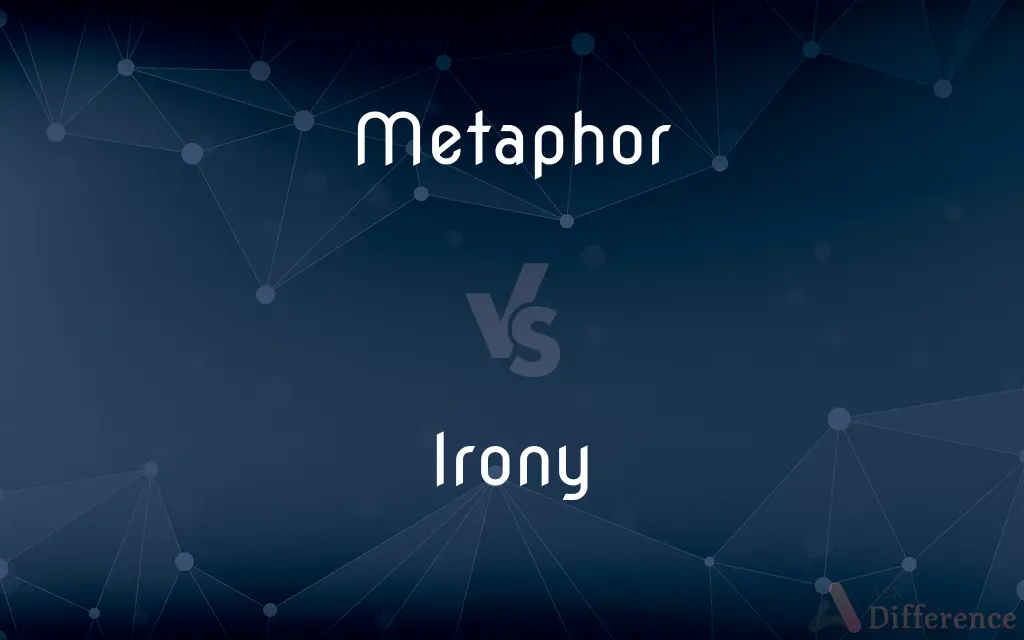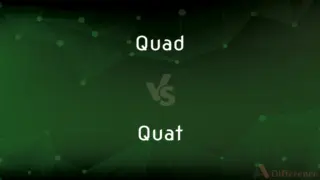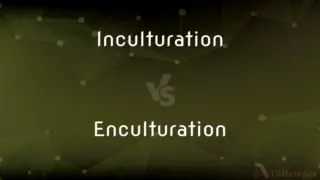Metaphor vs. Irony — What's the Difference?

Difference Between Metaphor and Irony
ADVERTISEMENT
Compare with Definitions
Metaphor
A metaphor is a figure of speech that, for rhetorical effect, directly refers to one thing by mentioning another. It may provide (or obscure) clarity or identify hidden similarities between two different ideas.
Irony
Irony (from Ancient Greek εἰρωνεία eirōneía 'dissimulation, feigned ignorance'), in its broadest sense, is a rhetorical device, literary technique, or event in which what on the surface appears to be the case or to be expected differs radically from what is actually the case. Irony can be categorized into different types, including verbal irony, dramatic irony, and situational irony.
Metaphor
A figure of speech in which a word or phrase is applied to an object or action to which it is not literally applicable
Her poetry depends on suggestion and metaphor
When we speak of gene maps and gene mapping, we use a cartographic metaphor
Irony
The use of words to express something different from and often opposite to their literal meaning.
Metaphor
A figure of speech in which a word or phrase that ordinarily designates one thing is used to designate another, thus making an implicit comparison, as in "a sea of troubles" or "All the world's a stage" (Shakespeare).
ADVERTISEMENT
Irony
An expression or utterance marked by a deliberate contrast between apparent and intended meaning
"the embodiment of the waspish don, from his Oxbridge tweeds to the bone-dry ironies of his speech and prose" (Ron Rosenbaum).
Metaphor
One thing conceived as representing another; a symbol
"Hollywood has always been an irresistible, prefabricated metaphor for the crass, the materialistic, the shallow, and the craven" (Neal Gabler).
Irony
Incongruity between what might be expected and what actually occurs
"Hyde noted the irony of Ireland's copying the nation she most hated" (Richard Kain).
Metaphor
The use of a word or phrase to refer to something other than its literal meaning, invoking an implicit similarity between the thing described and what is denoted by the word or phrase.
Irony
An occurrence, result, or circumstance notable for such incongruity
The ironies of fate. See Usage Note at ironic.
Metaphor
A word or phrase used in such implied comparison.
Irony
Dramatic irony.
Metaphor
The use of an everyday object or concept to represent an underlying facet of the computer and thus aid users in performing tasks.
Desktop metaphor; wastebasket metaphor
Irony
Socratic irony.
Metaphor
(intransitive) To use a metaphor.
Irony
(rhetoric) The quality of a statement that, when taken in context, may actually mean something different from, or the opposite of, what is written literally; the use of words expressing something other than their literal intention, often in a humorous context.
Metaphor
(transitive) To describe by means of a metaphor.
Irony
(countable) An ironic statement.
Metaphor
The transference of the relation between one set of objects to another set for the purpose of brief explanation; a compressed simile; e. g., the ship plows the sea.
Irony
Dramatic irony: a theatrical effect in which the meaning of a situation, or some incongruity in the plot, is understood by the audience, but not by the characters in the play.
Metaphor
A figure of speech in which an expression is used to refer to something that it does not literally denote in order to suggest a similarity
Irony
Socratic irony: ignorance feigned for the purpose of confounding or provoking an antagonist.
Irony
(informal){{cite-journal
Irony
Of or pertaining to the metal iron.
The food had an irony taste to it.
Irony
Made or consisting of iron; partaking of iron; iron; as, irony chains; irony particles; - In this sense iron is the more common term.
Irony
Resembling iron in taste, hardness, or other physical property.
Irony
Dissimulation; ignorance feigned for the purpose of confounding or provoking an antagonist.
Irony
A sort of humor, ridicule, or light sarcasm, which adopts a mode of speech the meaning of which is contrary to the literal sense of the words.
Irony
Witty language used to convey insults or scorn;
He used sarcasm to upset his opponent
Irony is wasted on the stupid
Satire is a sort of glass, wherein beholders do generally discover everybody's face but their own
Irony
Incongruity between what might be expected and what actually occurs;
The irony of Ireland's copying the nation she most hated
Irony
A trope that involves incongruity between what is expected and what occurs
Share Your Discovery

Previous Comparison
Quad vs. Quat
Next Comparison
Inculturation vs. Enculturation














































